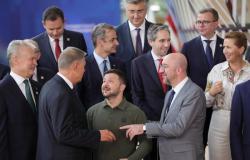The eve of the European elections is also seen by the world of the primary sector as an opportunity to bring agriculture back to the center of the EU. The invitation that also came from Todi from Confagricoltura is to look forward to build together the agricultural model that takes us to the future through open dialogue, listening, attention to the territory and above all with a scientific approach to the problems sustainability and production. All to aim for a more competitive, more sustainable, more innovative, more solid and more attractive European agriculture.
It was held in a packed Municipal Theater of the Umbrian city the ordinary general assembly of Confagricoltura Umbria. After the private part, also with the unanimous approval of the budget, a public meeting entitled “Which Europe for Umbrian agriculture”. At the center of the meeting are the themes that link the primary sector to the challenges that an increasingly European framework places before Italian and especially Umbrian farmers.
With institutional greetings from the mayor of Todi, Antonino Ruggianofollowed by introductions by Fabio Rossi, president of Confagricoltura Umbria.
After the intervention of Gabriele Cruciani (delegate of the rector of the University of Perugia to the Third Mission and Technology Transfer Sector) focused on environmental and energy sustainability, President Rossi spoke of a “scientific approach to the problems of sustainability” which is the one “that Confagricoltura likes and that we carry forward.”
“What we also ask of Umbrian candidates – he has declared Fabio Rossi – is to consider our approach, also so as not to create problems for the continuity of our farmers’ production. We called Professor Cruciani precisely to dispel many approaches that are not very scientific and not very consistent with the activity of agriculture. We need tools to move towards the ecological transition, and the experimentation protocol done with the University of Perugia goes in this direction, but at the same time we must be able to continue with the old tools until new ones are found” .
Cruciani spoke about environmental sustainability which “does not exist” without energy sustainability: “It all boils down to the energy problem alone, with a clean source and in good quantities sustainability problems can be solved”. Professor Cruciani also debunked the common opinion according to which the agricultural world is responsible for all environmental problems: “There are many opinions that point the finger at an agricultural world that is becoming less green but if you look at the numbers and facts this is not true”.
The president of the Agriculture Commission of the Chamber of Deputies then spoke, moderated by the journalist Giacomo Marinelli. Mirco Carloniand the outgoing Umbrian MEPs Camilla Laureti And Francesca Peppucci.
The proceedings of the conference were closed, with the moderation of the journalist Antonello Brughini, by the president of the Umbria Region, Donatella Teseiand from Massimiliano Giansantinational president of Confagricoltura.
Giansanti, in his first public appearance after the unanimous re-election at the top of the oldest agricultural professional organization for the next four years, highlighted the need for Europe to return to being a Europe strongly convinced that agriculture is a strategic factor: “We are therefore asking for a greater budget for farmers also in light of the challenges of the future such as climate change, market difficulties, producing more, increasing the food safety standards that citizens ask for, and on the issue of imports of products that come from outside Europe safeguard ourselves with regulations compared to those who produce with different standards. On the other hand, therefore, we need more resources and we need to go back to investing heavily in the primary sector.”
For Giansanti the current CAP is anything but an agricultural policy: “The agricultural policies adopted in recent years have contributed to decreasing the production capacity of European agriculture by 10%. But where today we don’t produce there is someone who does it in our place, because while Europe was declining someone produced more. It therefore becomes essential to position Italian companies in an increasingly global market. To be more productive and earn more, this is what farmers ask of us.”
“Europe is therefore losing its productive centrality – Giansanti underlined again – and before losing the primary production sector too, we reflected on what to do within the Italian agro-industrial chain to produce more and distribute a better income margin. To build a better relationship with the food industry we formed the Mediterranean association not to give a license to the Italian nature of those who operate in Italy but with the aim of promoting an economic model that puts the great values of Italian production at the center, recognizing us all in the great theme of the Mediterranean diet, with a system of rules that looks at agricultural production Italian according to a model that puts the food industry on one side, the agricultural company on the other and the University in the middle. This is because science and research are needed to increase production capacity.”
For Giansanti this is how we go about building “a vertical supply chain model which puts agricultural production at the centre, accompanied by the University, with the food industry which will benefit from it and which through supply chain contracts will recognize the farmer an allowance to be part of that certified supply chain”.
And regarding the reactions after the birth of Mediterranea, the president of Confagricoltura added: “If anyone believes that this model, which creates value, production, greater presence on the international markets of the Made in Italy brand, is obviously a problem either they don’t know the project and therefore they talk nonsense or on the contrary they get annoyed because we arrived first where others have not arrived.”
The Confederation, during the meeting in Todi, therefore reiterated the need for one profound review of the CAP through five basic objectives to be pursued: safeguarding production potential, diffusion of technological innovations, growth of environmental sustainability, protection of farmers’ income, reciprocity of rules in international trade.
Furthermore, during the next legislature – it was finally highlighted – it will be necessary to review some rules, such as those, for example, regarding the industrial emissions directive: agriculture, in fact, cannot continue to be equated with industry.






